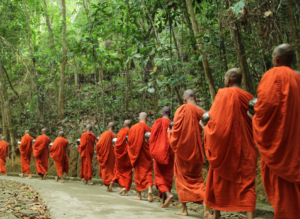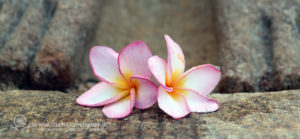Most people think that we are entering a great age of scientific knowledge and discovery, but no one has yet been able to surpass the knowledge and understanding possessed by the Supreme Buddha. He created an era of scientific knowledge which remains unparalleled today; this was the era of the Supreme Buddha Gautama. The era has not fallen into ruin; it is still very much alive.
Think about this for a while: millions of people today in India are followers of Ramayana. They believe in the gods, Rama and Sita. But, they have been unable to find any historical or archaeological evidence to prove that such gods existed on this earth. Furthermore, millions of people believe in a god called Krushna from the Bhagavadgita. Again, there is no such archeological evidence to assert that such a god lived on this earth.
What is mentioned in the Ramayana is about an age called Thretra. The Bhagavadgita refers to an age called Dvapara. Such eras might have existed in the past, but to this day there is not even one iota of evidence left to prove their existence. All such eras have disappeared due to the impermanent nature of life. Now, we are living in an age called Kali. This Kali age is made meaningful by the Supreme Buddha Gautama.
By now, even the life story of Jesus Christ is being subjected to strong arguments and heavy criticism by western scholars. Through the novel and the film The Da Vinci Code, that became popular around the world, the life story of Jesus Christ was subject to considerable controversy. Many books are being written stating that Jesus Christ was a Buddhist monk and that he stayed for some time in India. Statements casting doubts and suspicions about the credibility of the teachings in the Bible are spreading among the western scholars; meanwhile, a strange and uncertain atmosphere is developing with the homicides and various attacks committed by extremists Muslim groups around the world. No one can cover up the fact that the rapport between the two main and powerful religions, Islam and Christianity, is severely damaged once again.
In such an atmosphere, the age of the Supreme Buddha Gotama has started to shine calmly and slowly, spreading coolness to the burning world. The Life of the Buddha is a historical one. It has been proved with 100% certainty by archaeological evidence. It is so true that it has come to the point that no one in the world can reject His existence in any way.
The village Lumbini belongs to the government of Nepal. A stone pillar has been found erected there during the British occupation of those lands. This stone pillar was erected by King Ashok. A special inscription in Asoka Letters has been carved on it. The inscription reads as follows: “This is the birthplace of the Buddha Shakyamuni. This Village is exempted from paying taxes”.
There was an old shrine nearby. It was very carefully excavated by Nepalese archaeologists with the patronage of the Japanese government. Finally, to the joy and delight of the whole Buddhist community, the place where the Shakyamuni Siddhartha Gautama was born was also discovered. This is located in a preserved building two fathoms away from the Asoka Pillar. Now this is a historical truth which cannot be challenged in any way by anyone in the world.
In present day India, there is an area of land called Saranath, near Benares, belonging to the Uttar Pradesh province. The meaning of Saranath is “the Place of full protection”. It is the Isipatana Deer Park of Benares, where the first Dhamma sermon was delivered by Our Supreme Buddha. From the stone Scriptures, the sermon Dhammachakkapavattana (Turning the Wheel of the Dhamma) was discovered. The place where it was delivered has been ascertained with 100% certainty by archaeologists. This, again, is a historical truth.
In present India, there is a district called Gaya in Bihar. An old Uruvel territory is located in this district. This land is where our Supreme Buddha Gautama became enlightened, and it remains safely preserved even today. The area of land is called Bodhgaya, and it has become very popular all over the world as a result of the indomitable courage of Anagarika Dharmapala who protected the area from western forces.
The shrines and remnants of buildings constructed by the various kings since King Ashok can still be seen today. All this evidence proves that Buddhism flourished in India and no one can doubt the historical truth of these things.
In the province of Uttar Pradesh, there is a village called Kusinagar. Here, there is the Upavattana Sala Park of the Malla Kings of Parva city, where the Supreme Buddha Gautama passed away. This has also been accurately asserted by archaeological discoveries. Though the four memorial places of the life of our Supreme Buddha came under heavy and violent attacks, they remain safe through the Supreme Buddha’s miracle. There are no other such accounts of miracles like this in the world.
Furthermore, anyone can see for themselves the most sacred relics of the Supreme Buddha to this very day. These sacred relics have been respectfully kept on display in the Indian museum in New Delhi.
This is a great wonder; there is no such historical evidence collected like this about anyone else in the history of world.
Not only that, anyone can read the Noble Teachings of the Supreme Buddha in its pristine condition. These discourses in the Pali language have been translated into several other languages. The people in Thailand, Burma, Cambodia and India are fortunate to be able to read the sermons in their own languages. Furthermore, anyone who knows English has the opportunity to read the English translations of all these sermons.
When the King Buddhadasa reined the country of Sri lanka, there was a Tripitaka. The Tripitika had been translated into Sinhala but unfortunately this has been lost. After centuries, the Tripitika Translation Committee did translate the Tripitika once again into Sinhala, however it is a known fact that this translation is difficult to understand. There was a Tripitika Sinhala translation by Mr. H P De Soysa, however this has also gone missing.
The Buddhist Cultural Centre in Nedimale also published the Tripitka in Sinhala, which anyone can now buy and read.
The Tripitika translation published by us, the Mahamevnawa Monastery, has gained much admiration and respect from pious Buddhist devotees all over the world. Through our translation they have a wonderful opportunity to read and understand many dhamma discourses of the Supreme Buddha.
It has become apparent to everyone who looks at our translation without jealousy, that this is a rare opportunity for human beings living in this age to learn the Dhamma taught by the Supreme Buddha as it was intended.
In order to identify The Buddha, one should comprehend the Dhamma he taught “Yo Dhammam Passati- Soman Passati”. This means ‘one who sees the dhamma, sees me.’ These are the actual words of the Supreme Buddha himself.
The Supreme Buddha said to the monk Vakkali, who used to look with much admiration at the Supreme Buddha’s body endowed with its 32 special marks, that “Vakkali, what is the use of looking at this body full of repulsive aspects”. It is only through the Supreme Buddha’s teachings that we can learn His Ten Supreme Powers, The Four Wisdoms of Self- Confidence and all other wisdoms. The pious devotees who have gone to the three refuges know this well. A certain Lichchavi son called Sunakkatta was ordained by the Buddha. Later on he disrobed himself and left the monastic following. He started to condemn and criticize the Supreme Buddha amidst the people in the city of Vishala. This sinful person’s criticism would no doubt become an interesting point of discussion among the ignoble people in the city. They would have made evil attempts to dishonor the Supreme Buddha quoting this sinful person’s bad criticisms.
The most venerable arahant Sariputta on his alms round heard how this sinful man tarnished the qualities of the Supreme Buddha amidst the people. Then Venerable Sariputta made the Supreme Buddha aware of this. The Buddha showed the Venerable Sariputta that this sinful man, overcome by hatred, was praising Him with the underlying intention of disgracing him. The Buddha further showed that Sunakkatta, a hollow man, did not identify any of the great qualities and super human qualities of the Supreme Buddha. Then the Supreme Buddha taught venerable Sariputta that the He possessed ten fearless, unparalleled, extraordinary, confident and profound powers, and they are called the Ten Powers of the Tathagata. The Supreme Buddha stated that when he preaches to the world the Truth with these Ten Powers, that it is like a lion’s roar which transcends all the other sounds of other animals. He also compared it to turning a Brahma wheel which goes beyond all other teachings.
The Supreme Buddha has very clearly shown His Ten Supreme Powers as follows:
- The Tathagata Buddha has realized the things that will happen and the things that will not happen in the future in the exact way. This is His first Supreme Power.
- The Tathagatha Buddha has clearly realized the results of any kamma belonging to the past, present and future, its reasons, and the place where it gives its results. This is His second Supreme Power.
- The Tathagatha Buddha has realized the way the birth of any individual takes place, and what factors leads to that birth. He understands all the paths leading to birth in the heavenly worlds, the human world, and the lower worlds. This is His Third Supreme Power.
- The Tathagatha Buddha has realized the way how worldly beings match with each other; that is the ignoble coalesce with the ignoble, the ungrateful ones with the ungrateful ones, the bad with the bad, the good with the good, and the various and different matching natures as they really are. This is His Fourth Power.
- The Tathagatha Buddha has realized the diversity of beings and their various types of behaviors, desires, and emotions. It is in accordance with this knowledge that He teaches the Dhamma so that beings may best understand His Teachings. This is His Fifth Power.
- The Tathagatha Buddha has realized in the exact way how a person’s abilities develop, how they deteriorate, and accordingly their potential to realize the Dhamma. This is His Sixth power.
- The Tathagatha Buddha has realized the reasons for the decline of Jhana, Vimokkha, Samadhi, Samapatthi, that one gains as a result of meditation, and how to develop them again, in the exact way. This is His Seventh Power.
- The Tathagatha Buddha has realized how he has spent his past lives; not one or two lives but he can recollect an infinite number of past lives as they really were. This is His Eighth Power.
- The Tathagatha Buddha has realized the way how beings pass away and reappears according to their Kamma in its exact way, and how those who collect demerits go to lower worlds and how those who collect merits go to heavenly worlds. This is His Ninth Power.
- The Tathagatha Buddha has realized that through His efforts and great wisdom, He has eradicated all defilements and attained arahant ship. This is his Tenth Power.
The way our Supreme Buddha Gotama with these Supreme Powers preached the Dhamma confidently in the presence of gods, humans, maras, Brahmas, is unimaginably wonderful. In addition to these Ten Supreme Powers, Tathagatha Buddha has shown the unique Four Wisdoms of Self- Confidence:
- An ascetic, a Brahmin, a god, a mara, or anyone else in this world challenging the Supreme Buddha with reasons saying “you claim that you are fully enlightened but you have not understood such and such things” will never happen. There is not even a slightest thing that the Supreme Buddha has not understood. He who sees this with understanding lives fearlessly and confidently.
- An ascetic, a Brahmin, a god, a mara, or anyone else in this world challenging the Supreme Buddha with reasons saying “You claim that you are an arahant devoid of defilements but you have not abandoned such and such defilements” will never happen. The Supreme Buddha does not possess even the slightest defilement that other people can reprove. He who sees this with understanding lives fearlessly and confidently.
- An ascetic, a Brahmin, a god, a mara, or anyone in this world challenging the Supreme Buddha with reasons saying “ You have shown things that obstruct the path to Nibbana, but they are not obstructions if they are to be committed’ will never happen. There is not even the slightest obstruction that the Supreme Buddha has not recognized and understood as a danger on the path of Nibbana. He who sees this with understanding lives fearlessly and confidently.
- An ascetic, a Brahmin, a god, a Mara, or anyone in this world challenging the Supreme Buddha with reasons saying “ Though you have preached the dhamma in order for others to understand and realize, a person who practices your teachings is unable to attain freedom from suffering’’ will never happen. There is not even a slightest thing that the Supreme Buddha has not understood. Anyone who follows His Teachings will eventually gain freedom from suffering. He who sees this with understanding lives fearlessly and confidently.
Think about this for a while, we should at least develop a pleasant mind when thinking about the Supreme Buddha who possessed these Four Wisdoms.
He preached the First Noble Truth of suffering, and we should at least develop a pleasant mind by realizing that this Noble Truth is to be understood. He has preached ignorance and craving as the cause of this suffering in the Second Noble Truth. We should at least develop a pleasant mind by realizing that in order to gain freedom from this suffering that these causes should be abandoned. The cessation of suffering is the Third Noble Truth, and we should at least develop a pleasant mind that this Noble Truth is to be realized. The Noble Eightfold Path is the Fourth Noble Truth that the Supreme Buddha preached as the way leading to the cessation of suffering. We should at least develop a pleasant mind by realizing that this path should be followed with Sila, Samadhi, and Panna. What is the use of this human life if we do not try to develop a pleasant mind about the Supreme Buddha who possessed all these Wisdoms and Powers?
Ven. Kiribathgoda Gnanananda Thera




